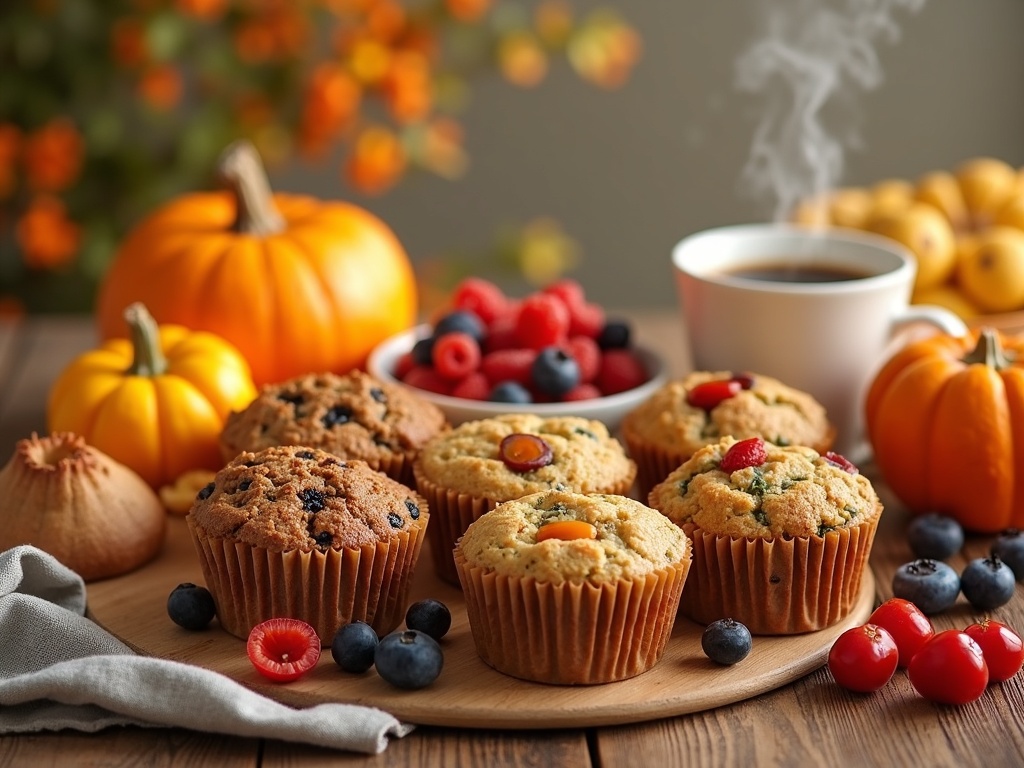Healthy breakfast muffins create a perfect balance of convenience and nutrition, offering a quick yet nutritious morning meal option packed with essential nutrients like fiber, protein, and vitamins. These versatile treats can fit any dietary preference while providing sustained energy throughout the morning, helping to improve brain function and keep energy steady until lunchtime.
Find In This Article
Key Takeaways
- Breakfast muffins typically contain just 150-200 calories per serving, significantly less than traditional pastries that often pack 300-500 calories.
- The meal prep potential of breakfast muffins makes them ideal for busy mornings, as they can be prepared in advance and stored in the refrigerator for up to a week.
- Whole wheat flour, rolled oats, Greek yogurt, and natural sweeteners like honey form the foundation for nutritious, energy-sustaining breakfast muffins.
- Common baking mistakes to avoid include overmixing the batter, skipping the preheating step, and removing muffins from the tin too quickly.
- These versatile treats can be easily adapted for various dietary needs including vegan, gluten-free, and low-sugar options, while offering both sweet and savory flavor profiles.
Why Healthy Breakfast Muffins Are Your Morning Game-Changer
I’ve discovered that starting my day with a nutritious breakfast makes all the difference in my energy levels and focus. According to NHS studies, a balanced breakfast can improve cognitive performance by 20% – that’s a significant boost to productivity! Healthy breakfast muffins have become my go-to morning solution, combining convenience with nutrition in one delicious package.
Nutritional Powerhouses in a Portable Package
These morning treats contain just 150-200 calories per serving, substantially less than traditional pastries which often pack 300-500 calories. But don’t let their small calorie footprint fool you – these muffins deliver impressive nutritional value. They’re rich in fiber, protein, and essential vitamins that fuel your body for hours.
What makes these muffins so special is their versatility. I’ve found that pumpkin protein muffins provide sustained energy throughout the morning, while egg muffin cups offer a savory alternative packed with protein. The combination of whole grains and nutrient-dense ingredients creates a perfect balance that keeps hunger at bay until lunchtime.
Time-Saving Solution for Busy Mornings
The beauty of homemade egg muffins and other varieties is their meal prep potential. I bake a batch on Sunday, and they last up to a week in the fridge – some varieties can even be frozen for longer storage. This makes creating a simple healthy breakfast routine practically effortless.
On hectic mornings when time is tight, having these ready-to-eat options means I can still enjoy a healthy filling breakfast without resorting to processed alternatives. I simply grab a muffin, pair it with a piece of fruit or yogurt, and I’m set for the day ahead.
The flexibility of breakfast muffin recipes lets me tailor ingredients to my nutritional needs:
- Oat-based muffins provide complex carbohydrates for sustained energy
- Adding nuts or seeds increases protein content and healthy fats
- Fresh or dried fruits contribute natural sweetness and additional vitamins
- Vegetable-packed versions offer extra nutrients in a tasty package
I’ve found that this simple morning change has transformed how I feel throughout the day. The combination of convenience, nutrition, and delicious taste makes healthy breakfast muffins a true morning game-changer that supports both immediate energy needs and long-term health goals.
Simple Ingredients for Nutrient-Packed Results
I’ve found that creating delicious healthy breakfast muffins doesn’t require a pantry full of exotic ingredients. The beauty lies in using simple, wholesome components that pack a nutritional punch while keeping preparation straightforward.
Core Ingredients That Make a Difference
The foundation of any good breakfast muffin starts with quality flour. I recommend using 1 cup of whole wheat flour instead of refined white flour. This simple swap significantly increases the fiber content and adds a nutty flavor that pairs beautifully with other ingredients.
Adding 1/2 cup of rolled oats brings texture and sustained energy to your morning muffins. Oats contribute additional fiber and create that satisfying chewiness that makes muffins so enjoyable.
For moisture and natural sweetness, I rely on 1/2 cup of mashed banana or unsweetened applesauce. These fruit-based ingredients reduce the need for added fats while contributing vital vitamins and minerals to your breakfast. They’re perfect for making protein-rich muffins that keep you full throughout the morning.
When it comes to sweeteners, I prefer using 1/3 cup of honey or maple syrup rather than refined sugar. These natural options provide more than just sweetness—they bring unique flavors and trace minerals that white sugar simply doesn’t offer.
For protein and creaminess, 1/2 cup of Greek yogurt works wonders. If you’re dairy-free, almond milk makes an excellent substitute. Both options help create that tender crumb that’s essential for perfect muffin cups that don’t dry out.
One large egg acts as the binder that holds everything together. For plant-based bakers, a flax egg (1 tablespoon ground flaxseed mixed with 3 tablespoons water) works remarkably well as a substitute.
Don’t forget these essential baking ingredients that might seem small but make a huge difference:
- 1 teaspoon baking powder for lift
- 1/2 teaspoon baking soda for tenderness
- 1 teaspoon cinnamon for warmth and flavor
- A pinch of salt to enhance all other flavors
The customization options truly make egg muffins and other varieties special. My favorite mix-ins include fresh or frozen berries, chopped nuts for crunch and healthy fats, or even a sprinkle of dark chocolate chips for an occasional treat.
I’ve discovered that these ingredients create the perfect balance of nutrition and flavor. By using whole grains, natural sweeteners, and protein-rich additions, these muffins become more than just breakfast—they’re a simple healthy breakfast that provides sustained energy.
The versatility of this ingredient list is what makes it so powerful. On busy mornings, having a batch of these nutrient-dense muffins ready to go ensures I start my day with something substantial and energizing. They’ve become my go-to healthy filling breakfast option when time is tight but I don’t want to compromise on nutrition.
Whether you’re feeding yourself, kids, or house guests, these basic ingredients transform into something remarkable—proving that healthy eating doesn’t require complicated recipes or hard-to-find components.
Baking Your Perfect Batch
The magic of healthy breakfast muffins happens when you nail the baking process. I’ve found that even the most nutritious ingredients can fall flat without proper technique. Let’s walk through the steps to ensure your muffins turn out perfectly every time.
Essential Baking Steps
First things first—I always preheat my oven to 350°F (175°C). This temperature creates the ideal environment for muffins to rise evenly without burning. While the oven heats up, I prepare my ingredients using the separate mixing method.
I keep wet and dry ingredients apart until the last minute. This isn’t just baker’s superstition—it prevents the activation of gluten too early, which can make your protein-packed muffins tough rather than tender. In one bowl, I combine my flours, leavening agents, and dry spices. In another, I whisk together eggs, oil, milk, and sweeteners.
When combining the mixtures, gentleness is key. I fold rather than stir vigorously, using a spatula to incorporate everything with minimal strokes. This careful approach maintains those air pockets that give egg muffin cups their delightful texture.
For portioning, I fill each muffin cup about 3/4 full. This allows room for rising without overflow. A cookie scoop or ice cream scoop makes this job cleaner and ensures consistent sizing.
The baking time sweet spot falls between 18-20 minutes. I look for a light golden color and the classic toothpick test—it should come out clean or with just a few crumbs. Savory egg muffins might need slightly less time than fruit-filled varieties.
After baking, patience pays off. I let my muffins cool in the pan for 5-10 minutes before transferring them to a wire rack. This resting period allows them to set up properly, making them easier to remove without breaking.
This technique works beautifully whether you’re making simple healthy breakfast muffins with basic ingredients or filling breakfast options loaded with nuts and fruits. The principles remain the same: gentle handling, proper temperature, and careful timing create muffins that are both nutritious and delicious.
Common Mistakes to Avoid
I’ve learned through many trial-and-error baking sessions that making perfect healthy breakfast muffins requires avoiding some key pitfalls. Even small mistakes can turn your nutritious morning treat into a disappointing experience.
Batter and Measurement Issues
Overmixing the batter is perhaps the most frequent error I see new bakers make. When you stir the batter too much, you develop the gluten in the flour, resulting in tough, rubbery muffins rather than tender ones. I always mix just until the ingredients are combined – those few small lumps are actually good!
Inaccurate measurements can completely throw off your muffin texture. While measuring cups work okay, a kitchen scale makes a huge difference in consistency. This is particularly important when working with alternative flours often used in simple healthy breakfast recipes, as they can compact differently than all-purpose flour.
Baking Process Mistakes
Skipping the preheating step is a shortcut that leads to disaster. Your oven needs to reach the right temperature before the muffins go in; otherwise, they’ll bake unevenly. I’ve found this especially true when making pumpkin protein muffins where the dense batter needs consistent heat.
Another common error is not testing for doneness properly. The toothpick test isn’t just baking folklore—it’s essential! Insert a toothpick into the center of your egg muffin cups or other varieties; if it comes out clean or with just a few crumbs (not wet batter), they’re done.
Many bakers also remove muffins from the tin too quickly. I let mine cool for about 5 minutes in the tin before moving them to a wire rack. This prevents them from falling apart while still warm.
Using paper liners without greasing them can cause your healthy filling breakfast muffins to stick. I either use silicone liners or lightly spray paper ones with cooking oil.
Lastly, many people overlook the importance of ingredient temperature. Cold ingredients like eggs, milk, and butter don’t incorporate as well as room-temperature ones. This is particularly important when making delicate egg muffins where texture is everything.
By avoiding these common mistakes, your healthy breakfast muffins will turn out perfectly tender, evenly baked, and deliciously satisfying every time.

Make Them Your Own
Healthy breakfast muffins can be customized to fit any dietary need or preference. I’ve experimented with countless variations and found that these morning treats are incredibly versatile. Whether you’re vegan, gluten-sensitive, watching your sugar intake, or just in the mood for something different, there’s a breakfast muffin recipe that will work for you.
Adapting to Dietary Needs
For those following a plant-based diet, breakfast muffins can easily be made vegan. I substitute eggs with a flax egg (1 tablespoon ground flaxseed mixed with 3 tablespoons water, left to gel for 10 minutes) which provides similar binding properties. Plant-based milks like almond, oat, or coconut work perfectly in place of dairy milk, and coconut oil is an excellent substitute for butter.
Going gluten-free doesn’t mean giving up on muffins. I’ve had great success using specialized flour blends that combine rice flour, tapioca starch, and potato starch. Make sure to use certified gluten-free oats if your recipe calls for oats, as regular oats may have cross-contamination. The texture might be slightly different, but the flavors will still shine through in your egg muffin cups or sweet varieties.
Watching your sugar intake? I often replace refined sugar with natural alternatives. Stevia works well for a zero-calorie option, though I use it sparingly as it can have a distinct aftertaste. Mashed dates create a wonderful natural sweetness and add moisture to the muffins. Ripe bananas or unsweetened applesauce can also reduce the need for added sugars while keeping muffins moist and flavorful.
If sweet breakfasts aren’t your thing, savory muffins offer a delicious alternative. I love adding combinations like spinach and feta with a few sun-dried tomatoes for a Mediterranean-inspired morning treat. These egg muffins pack protein and vegetables into one convenient package, making them perfect for busy mornings.
Seasonal ingredients add excitement to your breakfast routine. In fall, I incorporate pumpkin puree and warming spices into pumpkin protein muffins that are perfect with a cup of hot coffee. Summer muffins might feature fresh berries, while winter versions could include citrus zest and cranberries for brightness during darker months.
The beauty of breakfast muffins lies in their flexibility. I find they’re the perfect canvas for using whatever ingredients I have on hand. Overripe bananas, the last of a bag of nuts, or that half package of dried fruit can all find new life in tomorrow’s breakfast.
For a simple healthy breakfast that keeps me satisfied until lunch, I often pair a protein-rich muffin with some fresh fruit and a small yogurt. The combination provides a balance of nutrients that sustains energy levels throughout the morning.
The key to successful muffin variations is maintaining the right moisture balance. If you’re adding wet ingredients like grated zucchini or carrots, you might need to reduce other liquids slightly. Similarly, when using drier add-ins like protein powder, a splash of extra milk can help prevent dry muffins.
Batch cooking these customized muffins on weekends gives me a healthy filling breakfast option all week long. They freeze beautifully and can be thawed overnight in the refrigerator or quickly warmed in the microwave for those extra hectic mornings.

Storage and Meal Prep Tips
Healthy breakfast muffins aren’t just delicious—they’re also amazingly convenient for busy mornings when prepared ahead of time. I’ve found that planning ahead with these nutritious treats saves precious morning minutes while ensuring I start my day right.
Proper Storage Methods
To keep your homemade breakfast muffins fresh, store them in an airtight container in the refrigerator for up to one week. I prefer using glass containers with secure lids to maintain optimal freshness and prevent any absorption of unwanted refrigerator odors. For the best texture, let refrigerated muffins come to room temperature before eating, or warm them briefly in the microwave or toaster oven.
For longer storage periods, freezing is your best option. After your protein-packed muffins have completely cooled, wrap each one individually in plastic wrap or aluminum foil, then place them in a freezer-safe bag or container. This method prevents freezer burn and allows you to grab just one or two as needed. Frozen muffins stay good for up to three months and can be thawed overnight in the refrigerator or quickly warmed from frozen in the microwave.
Benefits for Busy Mornings
Simple healthy breakfast options like these muffins are game-changers for hectic schedules. Here’s why they’re perfect for meal prep:
- Ready-to-eat convenience eliminates morning cooking time
- Portable option for eating during your commute
- Customizable recipes allow for varying flavors throughout the week
- Egg muffin cups provide protein-rich savory alternatives
- Kid-friendly shapes and sizes make morning routines smoother for families
The beauty of nutritious egg muffins and other varieties is how they help maintain steady energy levels throughout your day. Unlike sugary breakfast options that cause energy crashes, properly made breakfast muffins with balanced ingredients provide sustained energy through complex carbohydrates, protein, and healthy fats.
This balanced approach also helps curb mid-morning hunger that might otherwise lead to unhealthy snacking. By including fiber-rich ingredients like oats, fruits, or vegetables in your muffins, you’ll stay satisfied longer. Many people find that investing time for weekend meal prep pays off with a healthy filling breakfast ready for each day of the week—supporting better eating habits and morning productivity.
Sources:
NHS, Eating Breakfast: Benefits
Journal of Nutrition and Health, Nutritional Profiles of Muffins
Appetite Journal, The Impact of Breakfast on Learning

